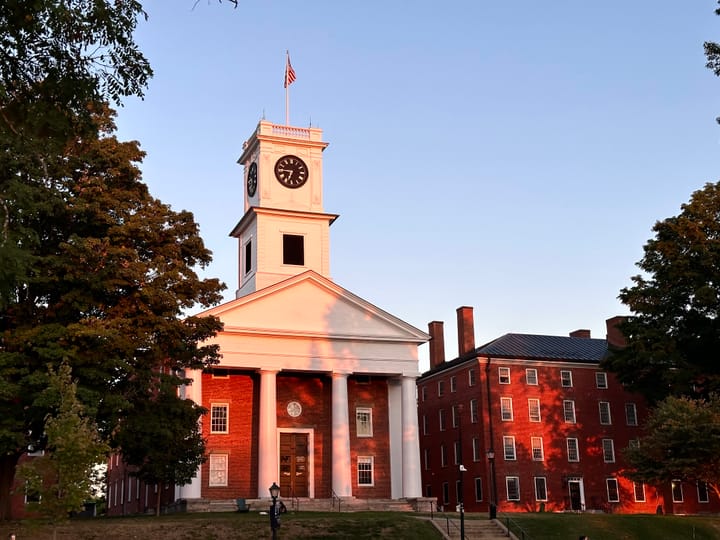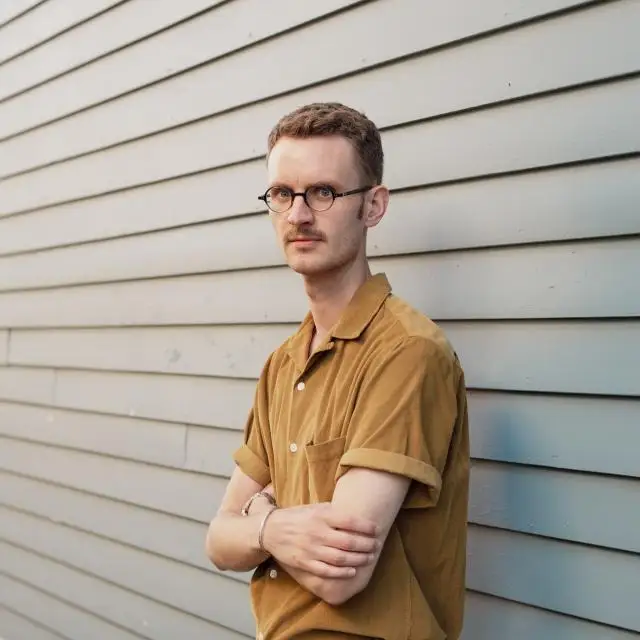New Education Studies Department Holds First Open House
Five minutes into the open house, Lewis-Sebring Visiting Professor in Education Studies Kristen Luschen cheered: “This moment has been a long time in coming. Welcome to the first Education Studies Open House!”
Luschen, the host of the event, was not exaggerating. She elaborated that “the study of education has been a consistent presence at Amherst since its founding. But it has not been a formalized program until now.”
Students will be able to officially declare an education studies major in the Fall 2021 semester. With only eight course requirements, each rooted in a different “home department,” Luschen pointed out that no one is in danger of running out of time to complete the major. Its multidisciplinary course requirements means it t also functions well as a double major too. Nicole Chung ’22, a chemistry major who plans to also declare education studies, added to this sentiment: “There are so many options for you to count things towards the major: sociology credits, American studies, Black studies, history.”
Within these eight courses, the education studies major requires students to engage with five specific areas. One of these is a foundational course entitled “The Purpose and Politics of Education,” which introduces students to the “fundamental debates within the field of education studies.” The second is a methodology course which prepares students to conduct their own research. The third requires students to take one course which approaches education studies from a global perspective. The fourth instructs students to take a 300 or 400-level course in which they produce a large research paper related to education. This course can help majors fulfill the final requirement — the completion of a capstone project or thesis.
Amherst’s exposure to education studies began with the introduction of a course in 1991, entitled “Reading, Writing and Teaching,” which was taught by Professor Karen Sánchez-Eppler — who is now the L. Stanton Williams 1941 Professor of American Studies and English and Chair of American Studies, as well as an education studies professor. The course considered the capacity of education to empower individuals, while also considering the institutional barriers to formal education.
A large component of the course is community engagement. As Sánchez-Eppler puts it, students learn the power of education in a “deep and immediate way” upon volunteering at adult learning centers in the area, such as the Holyoke Community College Adult Learning Center and The Literacy Project. As a testament to the long-standing popularity of education studies at Amherst, “Reading, Writing and Teaching” has been offered every semester since 1991.
Given the demonstrated appeal of education studies, students took the lead in catalyzing the development of an official education studies department. In the fall of 2013, members of the student organization EDU met with President Biddy Martin and Deans of Faculty Gregory S. Call and Catherine Epstein. They discussed an ambition to organize disparate faculty members into a working group which could blueprint an official education studies department.
Three years later, in 2016, a special colloquium course was offered which helped to work towards the goals set by the initial conversations in 2013. Co-taught by Loeb Program Director of Careers in Education Professions Robert Siudzinski and Professor of Black Studies and History Hilary J. Moss in Spring 2016, the colloquium continued to center students in the planning of the department. The students presented their final research to Amherst’s Committee on Educational Policy (CEP) at the end of the semester.
Much of the students’ research focused on the education studies programs of Amherst’s peer institutions, such as Williams College and Swarthmore College. Their programs focus on critical thinking, civic responsibility and community engagement. All three of these now serve as pillars of Amherst’s parallel department. Students from the colloquium also proposed a standing position — the Lewis-Sebring visiting professor of education studies — to tie together the highly interdisciplinary department. Currently, Luschen holds this position.
From 2017 to 2020, the students’ proposal was finalized by a working group of faculty, spanning nearly every one of Amherst’s departments. Finally, in the fall of 2020, the program was overwhelmingly approved.
Diana Tiburcio ’22 is a sociology major and will also declare in education studies next semester. Although the education studies major was introduced so recently, they have already begun a thesis within the department. Tiburcio’s research is “community-based” and focused on their former school — Passaic High School in Passaic, NJ.
“I’m really interested in the role that education institutions play in social mobility, especially for low-income students and racial minorities. I’m looking at the high school’s ‘College Readiness Model’, which pushes all students to go to college, to examine the extent to which it’s helping or inhibiting students’ success,” they said.
Tiburcio is focusing on Passaic students who may not have a natural interest in going to college to see whether the resources provided by the high school are really improving their chances for future success. “To what extent is the ‘College Readiness Model’ reinforcing social reproduction, instead of trying to improve the lives of students upon graduation?” Tiburcio questioned.
Tiburcio’s engagement with the education studies major was heavily influenced by their own personal interests, precisely the type of approach that the department encourages. In fact, Luschen remarked that the major reminds her of her graduate program. “It is a major with enough flexibility that you get to build connections across your interests, the things that totally excite you about education! Say you run across a fascinating idea about gender feminism, and you want to apply that to education, or even about sex-ed — you can piece together courses that will broaden your perspective on those topics.”
To highlight the broad scope of material that the education studies major can cover, Chung also explained the nature of her thesis. She plans to use the thesis to weave together her two majors, chemistry and education studies, in a unique way.
“I’m looking to do some research on the Being Human in STEM project that was created five years ago as a response to the Amherst Uprising,” she said. “I want to examine the social pathways that led to its creation, as well as the way it’s been spreading across higher education institutions. I’m really excited to apply sociological lenses to pedagogical research, while also conducting interviews and getting a little bit of history work into the mix.”
Tiburcio and Chung crafted specific paths within the major, but those involved with the department expressed that Education Studies is equally as valuable when approached from a wide angle. R. John Cooper ’64 Presidential Teaching Professor of Philosophy and Humanist Advisor Jyl Gentzler advocated for the broad appeal of the department.
“Education is determinative of our future and the way in which we interact with the world. Reflecting on education is important for our sense of who we are, and who we want to be and how we want to educate ourselves further. And the education of the population is crucial to the nature of democratic societies. How can you not be excited about it?” Gentzler enthused.
Siudzinski also noted the multitude of co-curricular opportunities related to Education Studies. Through the Loeb Center’s Careers in Education Professions Program, he will be hosting “treks” around the country to think tanks studying education policy, award-winning educational institutions ranging from pre-K to high school, graduate schools, museums and more. These will be open to majors and non-majors alike. The goal of the treks is to “expose students to the diversity of careers in education” beyond classroom teaching.
If students are interested in declaring the major in the fall, they are encouraged to email Luschen at kluschen(at)amherst.edu. In the meantime, Education Studies listings for the Fall 2021 semester can be found on the Amherst College course scheduler, and more information on the new department can be found on their homepage.





Comments ()